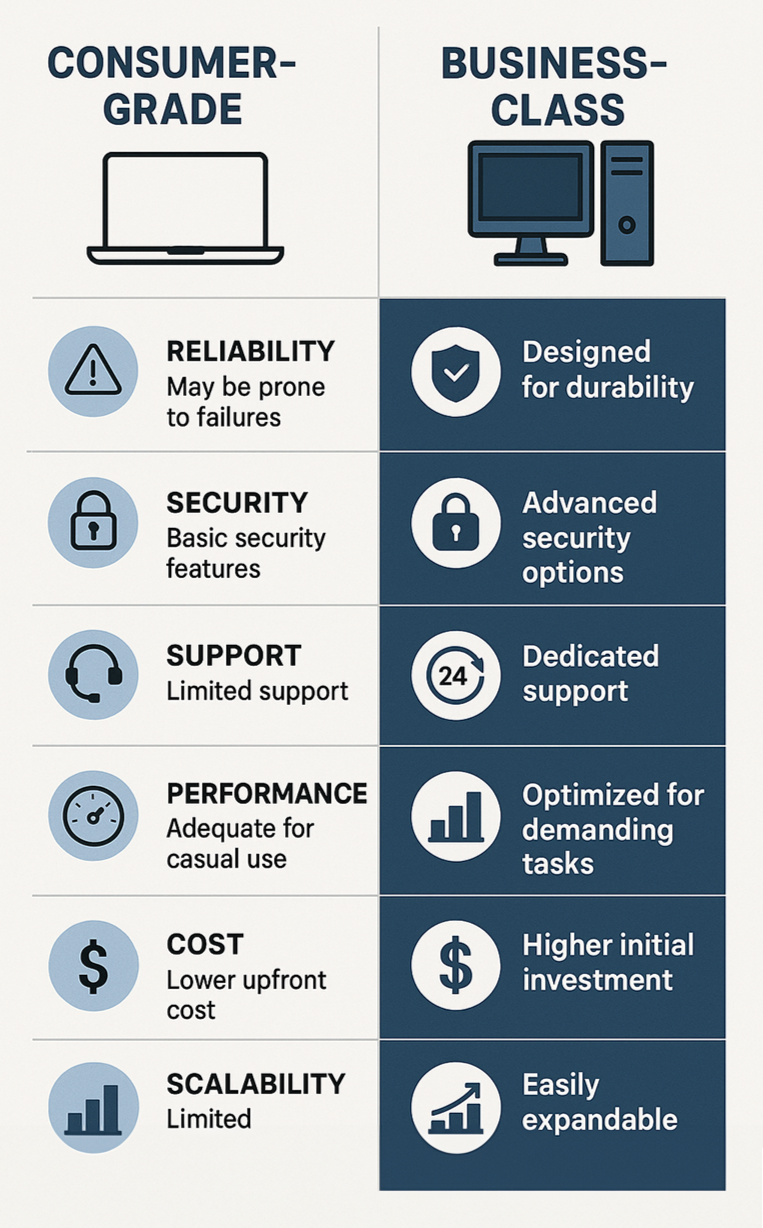The Foundation of Reliable Business Operations
Dallas-Fort Worth (DFW) companies are constantly looking for ways to stay ahead by boosting productivity, keeping customers happy, and laying the groundwork for future growth. Vital yet often overlooked decisions are made when purchasing the everyday technology your team relies on: computers, printers, and networking equipment. Many businesses, especially those looking to keep expenses down, mistakenly opt for the same electronics they might pick up for home use. While this might seem like a savvy short-term play, it can cause more problems and slow growth as the company evolves.
What Sets Business-Class Equipment Apart?
Business-class equipment forms the backbone of truly successful organizations because it is engineered for the demands of a work environment. Devices made for home are great for occasional web browsing or streaming, but they just aren’t built for eight-hour days or constant multitasking. In comparison, business hardware—think laptops designed for professionals or enterprise-grade networking gear—is built to run reliably all day, every day, often for years at a time. This quality helps prevent the kind of sudden breakdowns that halt operations and frustrate both employees and customers.
Security is another area where business-class devices shine. For instance, many business computers include special hardware like Trusted Platform Modules, which act like mini-safes inside your laptop or desktop, keeping things like passwords and sensitive business data extra secure. Features such as fingerprint or facial logins aren’t just for convenience—they add multiple layers of protection, making it much harder for information to fall into the wrong hands if a device is lost or stolen. These specialized security features are rarely included with standard consumer gadgets, which can leave you much more exposed to data breaches or cyberattacks.
Support, Cost, and Professionalism
Another major benefit of business-class equipment is the kind of support you receive when things go wrong. Unlike consumer systems, which often come with limited and frustrating help lines, business devices are sold with professional support in mind. This mean faster on-site service, longer warranties, or simply the peace of mind that comes from knowing your team can bounce back quickly if a device malfunctions.
Business-class computers and office gear also tend to offer substantially better performance. They run more powerful processors, have extra memory for juggling multiple programs at once, and are designed to keep up with heavy, real-world workloads. The office network—responsible for keeping everyone connected—relies on business-grade routers and switches too. These are built for lots of simultaneous connections and come with advanced management features to keep work and guest traffic separate and secure. That means fewer headaches from lost internet, dropped video calls, or slow access to files—critical for busy offices and teams that are growing or shifting toward remote work.
While it’s true that business-class equipment comes with a higher upfront price tag, it can be more cost-effective in the long run. It simply lasts longer, needs fewer repairs, and avoids productivity losses from regular breakdowns. Combined with better support and warranty coverage, your investment stretches much further.
Appearance and professionalism matter, too. Uniform, businesslike equipment presents a strong, consistent company image to clients and reassures staff. Standardization also makes it much easier and faster when onboarding new hires or resolving any technical issues.

Common Scenarios: Choosing the Right Equipment
Consider the case of a business owner outfitting an employee who mostly does administrative work—such as scheduling, answering emails, and simple data entry. The owner might be tempted to pick a lower-cost consumer laptop because, at first glance, the job seems basic. But if that employee will keep the machine running all day, access confidential client information, or occasionally connect from remote locations, the reliability and enhanced security of a business-class device become crucial. The owner can determine the best fit by thinking beyond initial sticker price and considering how often the machine will be used, if sensitive or regulated data is involved, and whether they want quick professional support if something goes wrong.
In another scenario, imagine a growing design firm expanding their office network to accommodate more staff and shared file storage. The firm’s owner could grab a consumer router and network switch from a big-box store, saving a bit of money. However, as usage increases—dozens of employees sending large design files, lots of video meetings, and the need for separate office and guest WiFi—the consumer gear starts to buckle, leading to slow speeds and connectivity issues. Business-grade networking hardware is engineered for exactly these circumstances, handling more traffic, offering built-in security features, and allowing easy upgrades as the company grows. The right choice here is determined by considering the long-term needs: if the team is growing, there is a need for reliable connectivity, and there are strict demands on security and performance, business-grade networking equipment is the smarter investment.
Investing in Your Business’s Future
Upgrading to business-class equipment doesn’t need to be overwhelming. Partnering with a local technology provider who understands DFW business needs is a strong first step. Leading business brands like Dell OptiPlex or Lenovo ThinkPad for computers, and Cisco or Ubiquiti for networking, are designed for reliability, security, and support. Always look for solutions with long warranties, regular updates, and long-term technical assistance built in.
Opting for business-class equipment is like building your company on a solid foundation. Rather than risking your organization’s reputation, output, and security on fragile or underperforming devices, you empower your team for efficiency, reliability, and growth. In DFW’s demanding market, that’s not just a luxury—it’s a necessity for long-term success.

